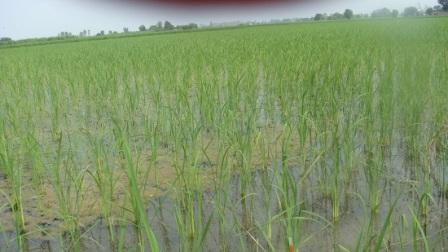Irrigation
Water conservation - A viable option to improve water availability - Solution Exchange paper
Posted on 11 Dec, 2010 12:16 PMThis paper from the recommended documentation section of the Solution Exchange for the Water Community Discussion Summary on the preparation of the strategic plan for rural drinking water by the Department of Drinking Water Supply, Ministry of Rural Development, is directed at stakeholders, planners, managers and consumers.
The paper argues on the importance of water conservation in the context of the increasing water shortages that the country has been facing in recent years because of expansion of irrigated areas and rapid industrialisation.
The article argues that water conservation practices need to be encouraged and improved through research, effective regulations, information dissemination and incentives to the end user and more emphasis needs to be placed on adequate coverage, quality monitoring and collection of field level data.
Direct seeding of rice A simple solution to India s water crisis?
Posted on 26 Nov, 2010 11:57 AMIn partnership with the Columbia Water Center, researchers from Punjab Agricultural University have initiated a multi-year project to implement and field-test diverse water-saving technologies, practices and policies aimed at reducing agricultural water use in the state of Punjab, particularly among rice farmers. In last year’s trial, the most successful project involved the installation of inexpensive tensiometers in the fields of over 500 farmers, yielding water savings of 30-35 percent.
Concurrently with the tensiometer trials, the team also recruited a smaller number of farmers to adopt a different way of cultivating rice altogether: Direct seeding of rice.
In traditional rice cultivation, rice is sprouted in a nursery; sprouted seedlings are then transplanted into standing water. With direct seeding, rice seed is sown and sprouted directly into the field, eliminating the laborious process of planting seedlings by hand and greatly reducing the crop’s water requirements.
 Conventional rice production requires standing water
Conventional rice production requires standing water
News roundup (16-22 November 2010)
Posted on 24 Nov, 2010 10:07 PMSanitation/Wastewater
- India tops the list of nations lacking toilets
- India hunts for a Rural Toilet Design, 1000 Euros up for grabs
- 82% of rural India deprived of three basic necessities of life — tapped drinking water, electricity connection and sanitation
- There are 700 million cell phone connections in India, but only half this number of Indians have access to private toilets, says a UN study
Watershed development in India: Biophysical and societal impacts - Research paper from Environ Dev Sustain journal
Posted on 15 Nov, 2010 11:12 PMThe paper argues that watershed management has to be fluid to take into consideration new realities like change in flow conditions, external realities like unintended impacts and the need to maintain minimum downstream flows for environmental and other purposes.
Enhancing crop water productivity to ameliorate groundwater decline - Article from Current Science
Posted on 15 Nov, 2010 10:55 PMThe following article is a literature survey of water management interventions taken up in Indian fields to improve the water productivity which would in turn reduce the groundwater decline.
News roundup (22 - 31 October 2010) :" India: Land of many cell phones, but fewer toilets"
Posted on 03 Nov, 2010 08:50 AMWastewater/Sanitation
River basin management: A negotiated approach - A report by Both ENDS and Gomukh
Posted on 21 Oct, 2010 08:34 PMThis report by Both ENDS and Gomukh compiles and showcases a set of seven case studies where a ‘negotiated approach’ to River Basin Management was already being used in different parts of the world and in different geographical and socio-political environments. It builds its analysis on real life experiences, including both successful and less successful attempts to implement and scale up local water management techniques. It sets out to go beyond general policy analyses, which tend to describe `what is’ or propose recipes that are based on theoretical research.
Tank irrigation in semi-arid tropical India: Economic evaluation and alternatives for improvement - A report by ICRISAT
Posted on 20 Oct, 2010 10:03 PMThis report by ICRISAT deals with a survey of thirty-two tanks and farm data from Andhra Pradesh and Maharashtra states to assess the economic performance of irrigation tanks in semi arid tropics of India. It uses district-wise data on climatic and institutional variables to analyze the factors affecting tank-irrigation density. Results indicate that the spatial distribution of irrigation tanks is determined primarily by physical factors—hard rock substratum, post-monsoon rains, low moisture-holding capacity of soils and by population density.
Mitigating the potential unintended impacts of water harvesting - A WHiRL Research Report
Posted on 20 Oct, 2010 07:28 AMThis report under the WHiRL research project by the Natural Resources Institute (NRI) identifies the potential unintended impacts of water harvesting so that, if at all possible they are avoided altogether, but if these do occur, they are recognised at an early stage and steps are taken to mitigate their affects. It highlights evidence that is emerging about water harvesting in semi-arid areas, on how water if used inappropriately, can lead to inequitable access to water resources and, in the extreme, to unreliable drinking water supplies.
Kisan Swaraj Yatra - A massive outreach effort interacting with farmers and urban citizens about the agricultural crisis and the way out
Posted on 15 Oct, 2010 12:41 PM
The Kisan Swaraj Yatra has been initiated by the Alliance for Sustainable and Holistic Agriculture (ASHA). This is a loose alliance of scores of groups across the country, drawn from more than 20 states. The network consists of farmers’ organizations, consumer groups, women’s organizations, environmental organizations, organic farmers’ cooperatives, individual scientists, doctors, health activists and others.





